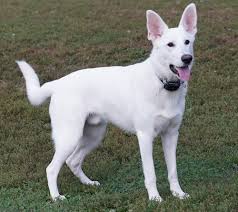
White Shepherd
Conditions of detention
White Shepherds are adaptable and can thrive in various living environments, but they do best in homes with access to outdoor spaces where they can exercise and explore.
Useful Fact:
White Shepherds are highly energetic and require regular exercise to stay happy and healthy. They enjoy activities like hiking, running, and playing fetch, making them ideal companions for active families or individuals.
Nutrition and diet
A balanced diet rich in high-quality proteins and essential nutrients is crucial for the White Shepherd to support its active lifestyle. High-quality commercial dog food or a diet incorporating lean meats, vegetables, and grains is recommended.
Useful Fact:
Feeding a diet that maintains a healthy weight and muscle mass is important for White Shepherds, as their active nature requires proper nutrition.
Health
White Shepherds are generally healthy dogs but can be prone to certain genetic conditions such as hip dysplasia, elbow dysplasia, and degenerative myelopathy. Regular veterinary check-ups are essential to monitor their health.
Useful Fact:
Regular screenings for common health issues, such as hip and elbow evaluations, can help catch potential problems early and ensure they receive appropriate care.
Grooming and care
The White Shepherd has a dense double coat that requires regular grooming to prevent matting and to remove loose hair. Brushing a few times a week will keep their coat healthy and reduce shedding.
Useful Fact:
During shedding seasons in spring and fall, more frequent brushing is necessary to manage their heavy shedding and keep their coat in good condition.
Education and training
White Shepherds are intelligent and eager to please, making them relatively easy to train. They respond well to positive reinforcement and consistency.
Useful Fact:
Early socialization and obedience training are crucial to ensure they develop into well-mannered dogs that are comfortable around people and other animals.
Toys and entertainment
These dogs enjoy toys that challenge their minds and bodies, such as puzzle toys, fetch toys, and interactive games. Engaging in activities like agility training and scent work can be very stimulating for them.
Useful Fact:
Providing a variety of toys and regular playtime helps keep them mentally and physically active, preventing boredom and destructive behavior.
Safety
Due to their strong protective instincts and high energy levels, White Shepherds should be kept in a secure area when outdoors. They need to be monitored to prevent them from wandering off or becoming overly protective.
Useful Fact:
A well-fenced yard is essential to give them the freedom to roam safely without the risk of escaping.
Accessories
Sturdy collars, harnesses, and leashes are important for managing the White Shepherd during training and outdoor activities.
Useful Fact:
Using a harness can provide better control and prevent neck strain, especially during walks and training sessions.
Socialization
White Shepherds are friendly and form strong bonds with their families but can be reserved with strangers. Early and consistent socialization is important to ensure they are comfortable in various environments.
Useful Fact:
Introducing them to different people, animals, and settings from a young age helps them become well-adjusted and confident adults.
Travel and Transportation
White Shepherds can travel well if they are accustomed to it from a young age. Ensuring they have a comfortable and secure space in the vehicle is important.
Useful Fact:
Using a travel crate or a harness designed for car travel ensures their safety and comfort during trips.
Behavior and psychology
The White Shepherd is known for its loyalty, intelligence, and strong protective instincts. They form strong bonds with their families and are naturally protective.
Useful Fact:
Understanding their protective nature and providing proper training can help manage their behavior and ensure they are confident and well-behaved.
Legal aspects
Owners should comply with general dog ownership laws, such as licensing, vaccination requirements, and leash laws.
Useful Fact:
In some areas, there may be specific regulations regarding protective breeds, so checking local laws is important.


